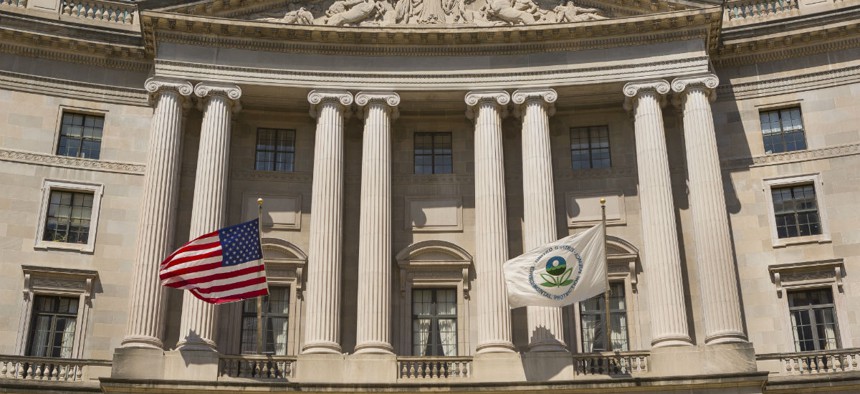
By Rob Crandall / Shutterstock.com
Former Republican EPA Chiefs Condemn Trump's Leadership of the Agency
Four former administrators say the Trump administration is putting the environment, and public health, at risk.
Former heads of the Environmental Protection Agency, from both Republican and Democratic administrations, blasted President Trump at a congressional hearing for the direction in which he is leading the agency.
The current administration is undermining science, disregarding career employees and creating too cozy of a relationship with regulated industries, four former EPA administrators told members of a panel of the House Energy and Commerce Committee on Tuesday, putting the public's health at risk. Each of those testifying had written a letter to Congress voicing their concerns and offering their help to direct oversight of the agency.
Christine Todd Whitman, who served as Republican governor of New Jersey before leading EPA under President George W. Bush, said the Trump administration was rolling back previous efforts to create a healthier environment.
“I’m deeply concerned that five decades of environmental progress are at risk because of the attitude and approach of the current administration,” Whitman said. She added the current EPA was disregarding science, while enabling undue influence from regulated industries. The agency’s policies are “driving people out and keeping new people away,” she said.
William Reilly, who headed the EPA under President George H.W. Bush, commended lawmakers for fending off proposed drastic cuts to the agency’s funding and staffing levels under Trump, though he noted EPA still spends less than it did under his leadership in inflation-adjusted terms.
Lee Thomas, who headed EPA during President Ronald Reagan’s second term, said he was concerned with the agency’s failure to lead on intergovernmental, international and scientific issues. He questioned whether EPA still has the capacity to conduct the reviews and analysis required of the agency.
Gina McCarthy, EPA administrator under President Obama, called on lawmakers to ensure that career workers at the agency are being heard.
Making progress on EPA’s mission means “fully engaging career employees in efforts to advance the agency’s mission by designing policies, programs and rules that are smart, reasonable and produce cost effective results,” McCarthy said. She implored Congress to “ensure that EPA is focused on its mission, to question whether the agency is appropriately including career staff in decision-making, is protecting scientists from political interference and is taking actions that make our lives healthier and our natural resources cleaner.”
Currently, she said, EPA is focused on delivering on Trump’s promise to “dismantle the EPA,” causing the agency to hemorrhage “valuable career staff.”
The Trump administration has faced consistent pushback for its leadership of EPA, both from inside the agency and the larger scientific community. A 2018 survey by the Union of Concerned Scientists found that 70% of employees in scientific jobs reported that senior decision makers from regulated industries had inappropriately influenced agencies' actions. About one-in-three respondents said influence of political appointees or the White House was a “top barrier to science-based decision-making.” Career workers have reported having to walk on eggshells as political appointees are looking for any excuse to fire them. EPA has lost about 6% of its employees, or about 1,000 workers, since Trump took office.
Some Republicans on the panel said the lack of trust in EPA in rural communities was understandable due to what they called a lack of transparency from the agency and decisions that were “aspirational” rather than scientifically based. When lawmakers asked the former administrators about the importance of protecting science from political motives, however, the witnesses said that independence was critical to protecting the public faith in the EPA.
“Since the agency's mission is to protect public health and the environment, that's based on science,” Whitman said. “That's not politics. That's not political.”
Several of the former administrators called on Congress to intervene to steer EPA back on what they described as the proper track. Part of that, they all agreed, was a more active role in combating climate change.
“I urge this committee, in the strongest possible terms, to exercise Congress’s oversight responsibilities over the actions and direction of EPA,” Whitman said.
Thomas suggested many of the issues EPA is currently facing—division between political appointees and career staff, attempts at defunding the agency, the undermining of science—plagued the agency before he took over its leadership. Only Congress, coupled with the right leadership, he said, was capable of putting it back on the right course. He and other former administrators called on lawmakers to statutorily clarify EPA’s authority and to provide it with “clear direction under the law.”
Reilly suggested Congress is facing a historic crossroads.
“I respect and admire the time and attention you are paying to the oversight of EPA,” Reilly said. “There has never been a time where it has been more urgently needed.”







